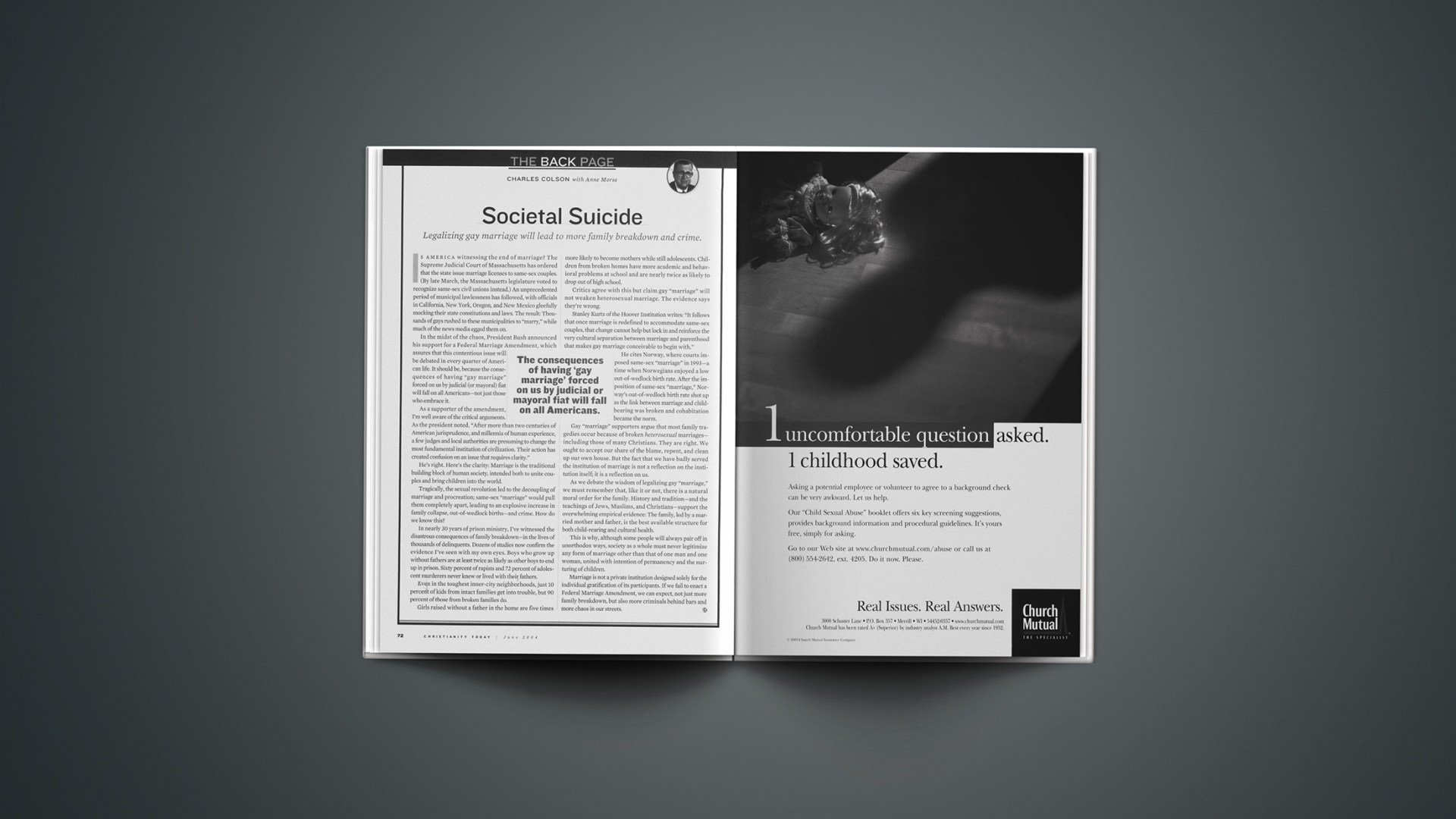The consequences of having “gay marriage” forced on us by judicial or mayoral fiat will fall on all Americans.
Is America witnessing the end of marriage? The Supreme Judicial Court of Massachusetts has ordered that the state issue marriage licenses to same-sex couples. (By late March, the Massachusetts legislature voted to recognize same-sex civil unions instead.) An unprecedented period of municipal lawlessness has followed, with officials in California, New York, Oregon, and New Mexico gleefully mocking their state constitutions and laws. The result: Thousands of gays rushed to these municipalities to “marry,” while much of the news media egged them on.
In the midst of the chaos, President Bush announced his support for a Federal Marriage Amendment, which assures that this contentious issue will be debated in every quarter of American life. It should be, because the consequences of having “gay marriage” forced on us by judicial (or mayoral) fiat will fall on all Americans—not just those who embrace it.
As a supporter of the amendment, I’m well aware of the critical arguments. As the president noted, “After more than two centuries of American jurisprudence, and millennia of human experience, a few judges and local authorities are presuming to change the most fundamental institution of civilization. Their action has created confusion on an issue that requires clarity.”
He’s right. Here’s the clarity: Marriage is the traditional building block of human society, intended both to unite couples and bring children into the world.
Tragically, the sexual revolution led to the decoupling of marriage and procreation; same-sex “marriage” would pull them completely apart, leading to an explosive increase in family collapse, out-of-wedlock births—and crime. How do we know this?
In nearly 30 years of prison ministry, I’ve witnessed the disastrous consequences of family breakdown—in the lives of thousands of delinquents. Dozens of studies now confirm the evidence I’ve seen with my own eyes. Boys who grow up without fathers are at least twice as likely as other boys to end up in prison. Sixty percent of rapists and 72 percent of adolescent murderers never knew or lived with their fathers.
Even in the toughest inner-city neighborhoods, just 10 percent of kids from intact families get into trouble, but 90 percent of those from broken families do.
Girls raised without a father in the home are five times more likely to become mothers while still adolescents. Children from broken homes have more academic and behavioral problems at school and are nearly twice as likely to drop out of high school.
Critics agree with this but claim gay “marriage” will not weaken heterosexual marriage. The evidence says they’re wrong.
Stanley Kurtz of the Hoover Institution writes: “It follows that once marriage is redefined to accommodate same-sex couples, that change cannot help but lock in and reinforce the very cultural separation between marriage and parenthood that makes gay marriage conceivable to begin with.”
He cites Norway, where courts imposed same-sex “marriage” in 1993—a time when Norwegians enjoyed a low out-of-wedlock birth rate. After the imposition of same-sex “marriage,” Norway’s out-of-wedlock birth rate shot up as the link between marriage and childbearing was broken and cohabitation became the norm.
Gay “marriage” supporters argue that most family tragedies occur because of broken heterosexual marriages—including those of many Christians. They are right. We ought to accept our share of the blame, repent, and clean up our own house. But the fact that we have badly served the institution of marriage is not a reflection on the institution itself; it is a reflection on us.
As we debate the wisdom of legalizing gay “marriage,” we must remember that, like it or not, there is a natural moral order for the family. History and tradition—and the teachings of Jews, Muslims, and Christians—support the overwhelming empirical evidence: The family, led by a married mother and father, is the best available structure for both child-rearing and cultural health.
This is why, although some people will always pair off in unorthodox ways, society as a whole must never legitimize any form of marriage other than that of one man and one woman, united with intention of permanency and the nurturing of children.
Marriage is not a private institution designed solely for the individual gratification of its participants. If we fail to enact a Federal Marriage Amendment, we can expect, not just more family breakdown, but also more criminals behind bars and more chaos in our streets.
Copyright © 2004 Christianity Today. Click for reprint information.










